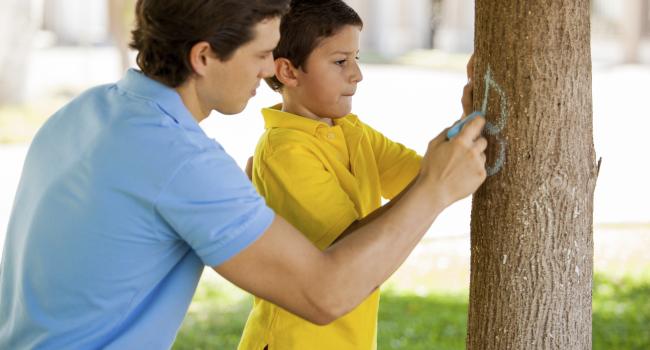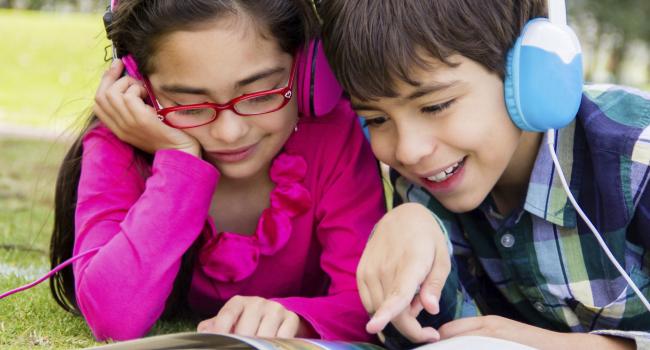
Literacy Development for English Language Learners
All parents can be helpful in their children’s literacy development, regardless of their language, education, or literacy level. Parents who speak little or no English can contribute to their children’s education in valuable ways. English language learners may benefit when they develop solid literacy skills in their first language before learning to read in a second one. Through their native language, they are developing key language and literacy skills that may enable them to become excellent readers in English.
Reading with Babies & Toddlers
It’s never too early to start reading to your child! While reading with a baby or toddler may look different than reading with an older child, there are lots of great activities you can do that will help get them ready to become readers. Take a look at our ideas below and at these books for young children too!

- Books for Little Ones: American Indian Heritage
- Books for Little Ones: Asian Pacific American Heritage
- Books for Little Ones: Hispanic Heritage
There are lots of things you can do at home to help your child get ready to read! Pointing out letters, practicing sounds, singing nursery rhymes, and reading stories together are just a few examples of the activities included in this section.
Featured Articles
- Why Reading to Your Kids in Your Home Language Will Help Them Become Better Readers
- Start the New Year Off Right: Resolve to Raise a Reader!
- Tips for Teaching Your Child About Phonemes
- Grocery Store Literacy for Preschoolers
- Sharing Wordless Picture Books
As your child begins to read, there are lots of things you can to practice those new skills at home. Re-reading a story, talking about books your read together, and playing word games are just a few examples of the activities included in this section for parents.
Featured Articles
- Patterns and Categorizing
- Making Predictions
- Getting Ready to Read: Family Activities
- Getting Ready to Read: Using Storytelling, Rhymes, and More!
- Why Reading to Your Kids in Your Home Language Will Help Them Become Better Readers
When your child is reading more independently, there are lots of things you can do to make reading enjoyable. Listening to your child read aloud, going to the library to check out new books or old favorites, and reading books in series are ways to help your child keep growing as a reader.
 Featured Articles
Featured Articles
- Teaching Sequence
- Science vs. Science Fiction
- How to Read Nonfiction Text
- Developing Research and Information Literacy
- Why Reading to Your Kids in Your Home Language Will Help Them Become Better Readers
Lots of kids love non-fiction books because they are about the world they know and see around them. Books about topics like animals, sports, other countries, volcanoes, bugs, dinosaurs, and famous people may be just the thing to get your child excited about reading! Here are some tips about reading and choosing non-fiction books.
Featured Articles
- Beat the Heat with Your Weather Page
- Getting the Most Out of Nonfiction Reading Time
- Got a newspaper? You’ve got learning!

Reading with your child is one of the best ways to help him or her become a better reader. But you may have some questions — which books should we choose? Which language should I use? Is reading an e-book different? These tips offer ideas and advice to help make the most of your reading time! For a complete list of our reading tips for parents, see Parent Reading Tips by Topic.
Featured Articles
- Tips for Parents of Babies
- Reading Aloud to Build Comprehension
- Why Reading to Your Kids in Your Home Language Will Help Them Become Better Readers
- How to Read an E-Book with Your Child
Do you have questions about which language to use when reading with your child? If so, you are not alone — many parents do! See our related articles and FAQs to learn more.
Featured Articles
FAQs
- Is it OK to read books to my child in my native language?
- If I only read to my child in my native language, will he ever learn to read in English?
- Should my child learn to read in English or our native language?
There are lots of ways for kids to practice writing at home, whether helping to make a grocery list, writing a story, or typing an e-mail to a friend or relative. These articles describe fun writing activities for kids of all ages.

Featured Articles
- Helping Young Children Develop Strong Writing Skills
- Graphic Organizers to Help Kids With Writing
- Writing and Spelling Ideas to Use with Kids
- Kids Who Blog
- Developing Writing and Spelling at Home
Learning to read and write can be very difficult. There are a wide variety of reasons why a child may be having a hard time. These articles provide tips on how to get support and advice if you think your child may need some extra help.
Featured Articles
- Handwriting: What’s Normal, What’s Not
- Successful Transition to Kindergarten for Learners Who May Be at Risk for Learning Disabilities
- Recognizing Reading Problems
- Learning Disabilities, Dyslexia, and Vision
- When Writing Is Hard

Written especially for parents, Growing Readers (formerly Ed Extras) provides tips for raising strong readers and writers. Schools and PTAs can add these preformatted briefs to their parent newsletters. Growing Readers is also a great resource for libraries and community literacy organizations. The one- or two-page articles are available as a PDF in both English and Spanish.
Featured Articles
- The Vocabulary of Science
- Think Like an Inventor
- Teaching Sequence
- Share What You Discover! Publishing Your Work
- Science vs. Science Fiction
ELL Resources by Grade
These resources for English Language Learners (ELLs) from Colorín Colorado are age-specific and are organized by grade. Some resources may be adaptable for younger or older students.
Each section contains a variety of resources, including articles, videos, webcasts, tip sheets, and recommended websites.
ELLs in Elementary School: These resources offer grade-specific ideas for teaching and supporting English language learners (ELLs) in early and upper elementary school. Ideas include tips for classroom teachers as well as ESL teachers.

ELLs in Middle & High School: This section includes a number of resources focused on English Language Learners (ELLs) in middle and high school. Topics include reading instruction for older students, content instruction, social and emotional issues, and college readiness.


